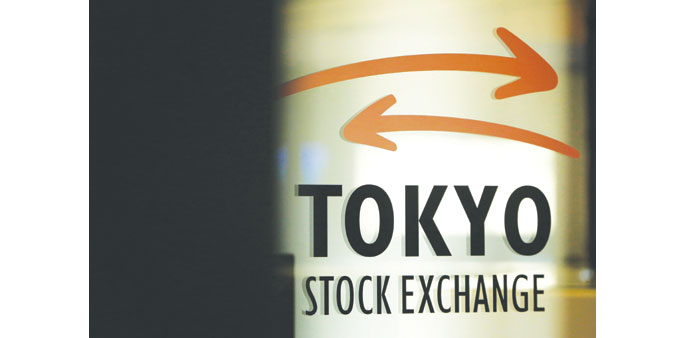The Tokyo Stock Exchange logo is displayed on a glass door. Tokyo closed up 0.46% at 15,529.40 points yesterday.
AFP
Asian markets mostly rose yesterday as investors await the release of key US data at the end of the week, while Shanghai and Hong Kong surged after China approved three private banks as part of an economic reform drive.
The euro struggled to break out from multi-month lows against the dollar and yen following another weak set of data that raised concerns about the eurozone.
Tokyo rose 0.46%, or 71.53 points, to 15,529.40 - its highest close since January—while Seoul closed 0.74%, or 14.96 points, higher at 2,048.81 but Sydney dipped 0.11%, or 6.1 points, to close at 5,577.4.
Shanghai rallied 2.41%, or 51.33 points, to 2,177.95 and Hong Kong added 0.88%, or 212.62 points, to 24,428.63.
Jakarta, Singapore and Kuala Lumpur were closed for public holidays.
In other markets, Bangkok lost 0.37% or 5.72 points to 1,538.13; import and export firm Berli Jucker rose 4.00% to 58.50 baht, while TMB Bank added 3.52% to 2.94 baht
Taipei dropped 0.20%, or 19.11 points, to 9,420.18; Taiwan Semiconductor Manufacturing Co was 1.22% lower at Tw$121.5 while Hon Hai Precision shed 2.78% to Tw$105.0.
Wellington slipped 0.14%, or 7.13 points, to 5,187.14; Contact Energy was down 0.72% at NZ$5.55 and Telecom eased 0.34% to NZ$2.94.
Manila fell 0.57%, or 39.08 points, to 6,850.47.
With few catalysts to push regional buying, dealers were looking ahead to Friday’s July non-farm payroll figures out of Washington. With last month’s report coming in well above forecasts there are hopes for another strong set of figures as the US economy picks up strength.
Wall Street ended last week on a low owing to disappointing earnings results, including from Amazon. The Dow slipped 0.72% and the S&P 500 dropped 0.48% after two straight record closes, while the Nasdaq lost 0.50%.
However, Asia started in an upbeat mood yesterday, with Shanghai leading the charge after officials approved the setting up of the private banks.
Beijing in March said it would reform the banking sector, which is dominated by four state-owned banks, in a drive to boost efficiency and help develop the economy. The announcement at the end of last week fuelled hopes for further measures from the country’s leaders to jolt the economy.
On currency markets, the euro continued to struggle after a closely watched index of German confidence slipped for a third straight month in July, hitting its lowest level since October owing to concerns about the crises in Ukraine and the Middle East.
The Ifo economic institute’s index tumbled to 108.0 points from 109.7 points in June, much lower than the 109.4 points forecast by analysts polled by Dow Jones Newswires.
The euro was at 136.81 yen compared with 136.76 yen, around its weakest since February, while it was also at $1.3433 against $1.3430 - hovering at eight-month lows. The dollar bought 101.87 yen against 101.83 yen in New York Friday.
While regional markets are higher, investors are still wary of geopolitical tensions, with analysts warning the eurozone economy could be hurt by any fresh sanctions on Russia for its support of anti-government rebels in Ukraine.
In oil trade, US benchmark futures contract, West Texas Intermediate (WTI) for September, dipped 47 cents to $101.62 a barrel. Brent North Sea crude for September delivery was down 50 cents at $107.89 a barrel.
Gold fetched $1,304 an ounce compared with $1,292.42 late Friday.

